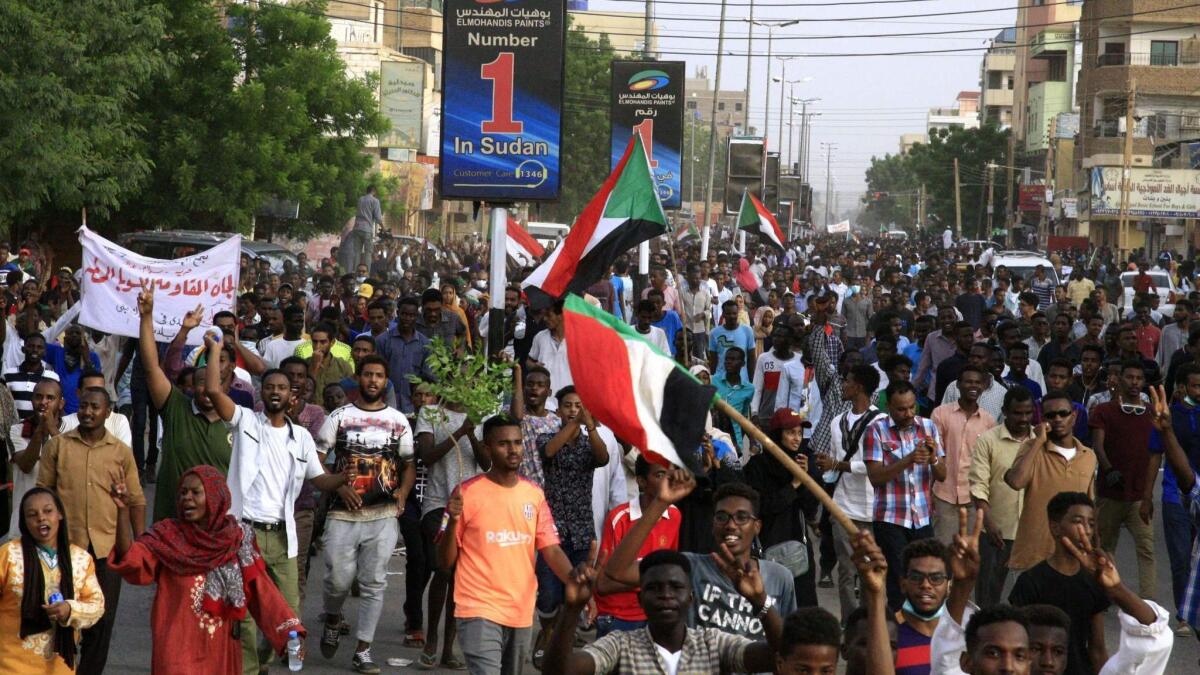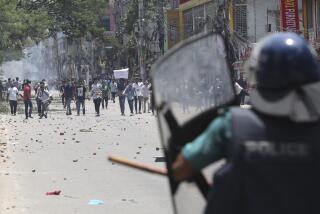At least 7 dead as Sudanese protest against military rule

- Share via
Reporting from Khartoum, Sudan — Tens of thousands of protesters took to the streets in Sudan’s capital and elsewhere in the country Sunday calling for civilian rule nearly three months after the army forced out long-ruling autocrat Omar Hassan Ahmed Bashir.
A government official said at least seven people had been killed and nearly 200 injured during the demonstrations.
The protests came amid a weeks-long standoff between the ruling military council and protest leaders. Talks between the two sides over a power-sharing agreement collapsed when security forces violently broke up a protest camp in Khartoum.
At least 128 people were killed across Sudan in the ensuing clampdown, protest organizers said. Authorities put the death toll at 61, including three security forces.
Soliman Abdel-Gabbar, acting undersecretary of health, reported Sunday night that at least seven people died during the day’s disturbances. He said 181 people were injured, including 27 with bullet wounds.
The marches, the first since the June 3 crackdown, also mark the 30th anniversary of the Islamist-backed coup that brought Bashir to power in 1989, toppling Sudan’s last elected government. The military removed Bashir in April amid mass protests against his rule.
The crowds gathered at several points across the capital and its sister city of Omdurman before marching toward the homes of those killed since the uprising began.
“This is a very important day for the Sudanese people,” protester Hamdi Karamallah said.
The protest movement erupted in December, triggered by an economic crisis. The protesters remained in the streets after Bashir was overthrown and jailed, fearing that the military would cling to power or preserve much of his government.
Gen. Abdel Fattah Burhan is head of the military council.
On Sunday, protesters chanted anti-military slogans like “Burhan’s council, just fall,” according to video clips circulated online.
The video showed protesters running away from security forces in the streets of Khartoum and seeking shelter from clouds of tear gas.
Mohammed Yousef Mustafa, a spokesman for the Sudanese Professionals Assn., or SPA, a leading protest organization, said security forces used tear gas to disperse protesters in Omdurman and the district of Bahri in the capital.
He said protests also erupted in Atbara, a railway city north of the capital and the birthplace of the uprising that led to Bashir’s ouster.
The the medical arm of the SPA said a protester in his 20s was shot to death in Atbara. Nazim Sirraj, a prominent activist, said at least four people were killed in Omdurman.
The SPA later called on protesters to march on the Nile-side presidential palace in Khartoum, as security forces closed off roads and bridges leading to the palace. The groups later said security forces barred the protesters from reaching their destination.
The Forces for the Declaration of Freedom and Change called on protesters to head to other squares in Khartoum and Omdurman.
Gen. Mohamed Hamdan Dagalo, deputy head of the military council, said the generals want to reach an “urgent and comprehensive agreement with no exclusion.”
“We in the military council are totally neutral. We are the guardians of the revolution. We do not want to be part of the dispute,” he told a gathering of army supporters.
More to Read
Sign up for Essential California
The most important California stories and recommendations in your inbox every morning.
You may occasionally receive promotional content from the Los Angeles Times.










